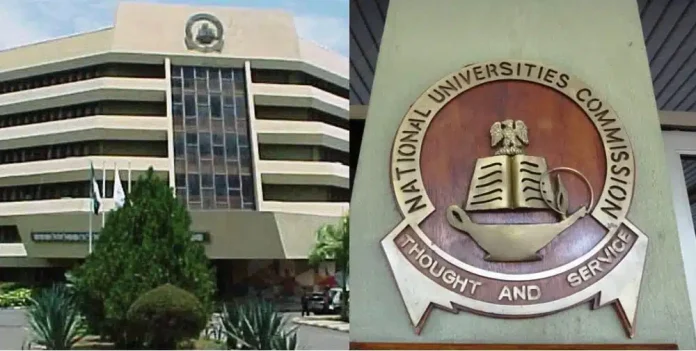The National Universities Commission (NUC) has disowned a programme claiming to bridge the gap between polytechnic and university degrees.
It could be recalled that the National Board for Technical Education, (NBTE) which regulates technical and vocational education has unveiled what it described as a one-year top-up program which offers a platform for HND holders to level up towards obtaining a bachelor’s degree.
However, in a statement on Saturday, the NUC disowned the NBTE scheme, distancing itself from such.
Acting Executive Secretary of NUC, Chris Maiyaki, in the statement, made available to newsmen in Abuja on Saturday, described the purported one-year top-up degree programme in Nigerian Polytechnics as not feasible.
The NUC boss, who personally signed the statement, said the existing dichotomy between first degree and HND has not been abolished even as universities and polytechnics have their individual unique programmes which would pose a challenge to such a conversion scheme.
“The attention of the National Universities Commission (NUC) has been drawn to the news (online) that the National Board for Technical Education (NBTE) has officially introduced a one-year top-up degree programme in Nigerian Polytechnics to enable holders of the Higher National Diploma (HND) to convert their certificates to the first degree with foreign accredited universities.
The online news, which was credited to the Executive Secretary of the NBTE, Prof Idirs Bugaje and the Board’s Head of Media Unit, Mrs Fatima Abubakar, revealed that the action was in furtherance of the advocacy for the removal of the existing dichotomy between degree holders and HND graduates in their various places of work, and to enhance the beneficiaries’ opportunities for further studies.
The NUC wishes to inform the Management of the NBTE and the general public that the “Bill for an Act to Abolish and Prohibit Dichotomy and Discrimination between First Degree and Higher National Diploma in the Same Profession/Field for the Purpose of Employment, and for Related Matters”, which was passed by the 9th National Assembly in 2021, is yet to be assented to by Mr. President and Commander-in-Chief of the Federal Republic of Nigeria. So, even though agitation continues to grow for the abolition of the dichotomy in Nigeria, there is, at the moment, no law that has removed the dichotomy between a university degree and the HND.
Both the NUC Establishment Law (CAP N81, LFN, 2004) and its Operational Law: Education (National Minimum Standards and Establishment of Institutions) Act, CAP E3 LFN, 2004) vest in the Commission the powers to superintend and regulate university education in Nigeria, lay down minimum academic standards in the nation’s Universities and other degree-awarding Institutions, and accredit their programmes. Thus, the Commission is the only constitutionally empowered regulatory agency for university education in Nigeria.
Pursuant to the sustained commitment of the NUC to the development of a balanced, well-coordinated and productive University System that guarantees the delivery of quality education relevant to national development, and in the face of global competitiveness, the Commission wishes to state, categorically, that:
The place of technical education, the world over, is unique. Thus, in most higher education systems, Polytechnics co-exist side by side with Universities for the purposes of producing critical human resources, based on their peculiarities and in tandem with the the goals for which they were established, abinitio;
The university degree awarded by the Nigerian University System or any cognate Institution is not the same as the HND awarded by Polytechnics in Nigeria. In the Nigerian higher education space, the processes, contents and methods required for the acquisition of a university degree are substantially different from those needed for HND programmes;
At the post-graduate level, the requirements for admission into any master’s degree programme in Nigerian Universities for candidates with HND are, among others, the acquisition of a Postgraduate Diploma (PGD) from a recognized University in an area relevant to that for which the Master’s admission is being sought. To this end, it is implicit that beneficiaries of the NBTE’s Top-Up Programme shall be subjected to extant admission requirements by Nigerian Universities, should they desire to further their studies in the NUS, and
The unsuspecting general public and all relevant Ministries, Departments and Agencies (MDAs) should, please, note that the NUC is not a party to and, indeed, disavows the so-called Top-up Scheme, being concocted by the NBTE.
In the light of the above, the advice of the NUC is that the NBTE should focus on its core mandate and desist from introducing programmes that are outside its jurisdiction and not supported by any law in Nigeria. The Commission does not entertain any intrusion into its lawfully assigned mandate.”














